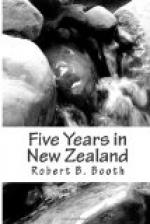The yard being cleared, a steady old working bullock is now driven alongside our young friend, and the two are yoked together neck and neck, the trained bullock selected being always the more powerful of the two. The ropes are then unfastened and the pair left free to keep company for a month or so, by which time the old worker will have trained his young charge sufficiently to permit of his being put into the body of a team and submitted to the unmerciful charge of the bullock puncher (driver). There is no escape for the novice then, yoked fast to a powerful beast with others before and behind, and the cruel cutting whip over him, in the hands of a man possessing but little sentiment: he must obey, and after a time becomes as tractable as the rest. Indeed, it is wonderful how intelligent and obedient these animals become under the hands of an experienced driver. There is a code of bullock punching language they soon get to understand; they answer readily to their names, and are, if anything, more sensible, obedient, and manageable than horses.
My ride with Hudson, which I referred to, was as hard a day’s work as I have experienced of the kind. We started from the Ashburton at daybreak, and after a quiet canter of five miles, reached an open piece of river bed flat, on which were grazing some two hundred head of cattle, amongst which were five young bullocks of Hudson’s he wished to cut out and drive to Moorhouse’s station on the Rangitata, about twenty miles further south. The cutting out is more difficult than driving the whole herd, which will be apparent.
Having entered among them and found the animals we were in search of, we proceeded quietly to move them to a common place near the edge, from which we meant to drive them, and Hudson, who had considerable experience, succeeded after a while in collecting his five beasts in a favourable spot for our enterprise. We then took up positions on either side, and with a sudden spurt endeavoured to drive them on to the plain. We were partially successful, leaving only one of the five behind, and we got the other four clear away some miles before they seemed to be aware of the absence of their comrades, but with some smart galloping we were keeping them well together in the direction we wanted to go. We were not, however, destined to continue fortunate for long. After a while we unexpectedly came across a herd of fresh cattle, into which our charges at once bolted, and it took two hours hard galloping before we succeeded in extricating only two of them. With these we were obliged to be satisfied; our horses were showing signs of fatigue, and without fresh mounts and other assistance it would be impossible to cut out the others that day.
[Illustration: THE BAKED STEERS.]
Fortunately those we had went away quietly, and we hoped that no further impediment would occur. We were sadly mistaken. For six miles all went well, but it was then clear that the animals were getting baked (jaded); they were in too good condition for the hard cutting out twice repeated.




